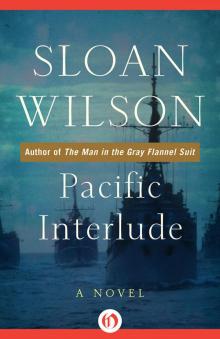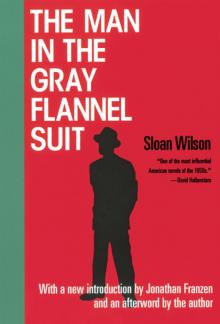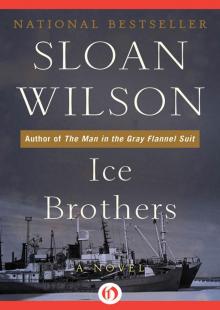- Home
- Sloan Wilson
Ice Brothers Page 10
Ice Brothers Read online
Page 10
Two days later the Nanmak left the yard for Norfolk, Virginia, where she was to be fitted with special equipment before sailing north. A week after that the Arluk got orders to start for Greenland the following Thursday, April 30. Paul was so involved in the frantic last-minute preparations, and Mowrey continued to discipline him so severely that he got only one night ashore to see his wife, a fact which made Chris shake his head in dismayed disbelief.
That one last night with Sylvia under the eaves of the old colonial house was wonderful, of course, and also so troubling in many ways that Paul simply could not allow himself to think of it now. He was so tired and so keyed up when he came to Sylvia that their love-making was nothing like the fantasies both of them had had. She too was tense and full of a strange sense of failure. The truth was that they spent part of their last night crying in each other’s arms like heartbroken children, but there had been more to it than that, and Paul simply could not allow himself to dwell on this joyful, painful meeting and parting at a time when his head was full of dozens of lists of things he had to do immediately to get the ship ready to sail. As he told Sylvia when he kissed her good-by, the only thing they should remember was that they loved each other and that there certainly was no doubt about that. If a night of passion at a time of crisis was not always what it was cracked up to be, that was nobody’s fault at all, he told himself, but he was afraid to say that to her. Instead he told her that he loved her so many times that it began to sound ridiculous and added that she was the most beautiful girl in the world and was getting prettier all the time. Just before he left she said, “Paul—I guess I should ask you for the registration of the car. I never get stopped, but you can’t tell.”
He took the paper from his wallet and handed it to her. “Be careful,” he said. “Be careful! Take care of yourself.” Then he ran.
CHAPTER 10
The Arluk sailed from the shipyard at seven in the morning. It was a rainy, windy day, cold for spring, but nowhere near as cold as it soon was going to be, Paul reminded himself as he buttoned his parka under his throat. The departure from the wharf was as undramatic as it could possibly be. Two bored yard workers cast off their lines and hurried back into the warmth of the sheds without a wave or a backward glance. Mowrey gave three short blasts of the ship’s surprisingly high, unauthoritative air whistle as he backed into the harbor. The seamen who were not on watch hurried below to get coffee as soon as they had stowed the lines.
While Mowrey conned the ship, Paul stood on the starboard wing of the bridge watching the familiar coastline and islands of Boston harbor slip by. How many times had he sailed out of this harbor aboard the Valkyrie? It occurred to him that this voyage might end disastrously for him and that he might never see Boston or the U.S. again. This thought seemed absurdly melodramatic and he dismissed it.
“Yale, tell Cookie to bring me a cup of coffee,” Mowrey said.
Paul relayed the message to the forecastle by telephone. When Cookie appeared with the coffee, Mowrey ducked into his cabin and shut the door. When he reappeared a moment later, the smell of whiskey rose from the coffee cup, almost as visible as the steam.
The bay was relatively calm, but soon after they left the lightship, they encountered big swells rolling in on their starboard beam from the broad Atlantic and the trawler began to roll. First a pair of binoculars slipped from a shelf in the bridge where Paul had carelessly left them.
“Don’t you know that ships roll, Yale?” Mowrey asked.
Next Mowrey noticed that some big reels of cable which were part of their deck cargo had not been lashed in place securely enough and were starting to move.
“Get Farmer and secure that damn stuff before it carries away,” Mowrey said. “What’s the matter with you people? Can’t you do anything right the first time?”
By the time the reels of cable were secured, the ship was rolling with greater violence than the old Valkyrie, with her deep keel and sails, had ever rolled. Cookie suddenly appeared in the forecastle door and shouted, “Mr. Schuman, everything’s going crazy down here!”
Everything was. A dozen young seamen lay moaning in their bunks and one had vomited all over the deck. Cookie had never been to sea, and had had no idea of how to stow the galley. Paul realized that he should have foreseen this. Now pots, pans, broken dishes and open cannisters of flour, sugar and rice pursued each other back and forth across the galley deck. Astonishingly, Cookie was not in the least seasick. He was just furious.
“Get me some men to clean this up!” he shouted to Paul. “Such a mess is no job for a chef!”
Paul appointed three men who didn’t look too seasick to the cleaning detail. Trying to help with the drums of wire cable had left his hands cold and he hurried aft to the wardroom to get gloves. Green was sitting on the edge of his bunk vomiting into a bucket. Books and boxes of writing paper which disgorged their contents were sliding back and forth on the cabin sole. The smell of sickness was strong.
“Where did you get the bucket?” Paul gasped and before Green could answer, dashed for the head. He had never been seasick aboard the old yawl, but he felt as though the convulsions of his stomach would never stop now. Seeing a bucket behind the head, he grabbed it and staggered toward his bunk. The wardroom telephone rang before he could sit down.
“Yale, is that you? Come up to the bridge! I didn’t tell you to lay below, did I?”
Carrying the bucket with the handle hooked around his arm, Paul walked toward the bridge. As he climbed up the steps to it, he had to pause, clutch the railing as the ship gave a particularly vicious roll, and retch into the bucket again.
“What have you got that bucket for, Yale?” Mowrey asked pleasantly as Paul entered the pilothouse. He was holding his cup of whiskied coffee in one hand and a cigar in the other. The tobacco smoke, the fumes of booze and the odor from another bucket in which the helmsman had been sick were overpowering. Paul retched into his bucket again.
“I don’t mind anybody being seasick as long as he don’t miss any duty,” Mowrey said with a great show of tolerance. “By the time you get to Greenland, you’ll either be over it or near to dying. Some go one way, some the other.”
Sipping from his cup, he smacked his lips and took a puff from his cigar. “The best cure for seasickness, I find, is a glass of warm gin with a cunt hair in it. Too bad we don’t have the ingredients handy.”
Both the helmsman and Paul retched into their buckets simultaneously. Glancing toward the sky, Mowrey cleared his throat and sang, “Roll, baby, roll, roll, baby, roll. You never can roll too much for me.”
“Did you ever hear that song?” he asked Paul.
“No.”
“They used to sing that on the vessels when I was a kid. Man, do you realize that Greenland is right up there over our bows? If the weather holds we’ll be there in a couple of weeks. I can just smell them Eskie girls now.” Looking up, he began to sing again: “Them Eskie girls don’t take no baths and they wash their hair in piss, but they have a way of loving that no man ought to miss.”
“Did you ever hear that song?” he asked Paul.
“No!” Paul said and retched into his bucket again.
“They used to sing it on the vessels when I was a kid. Man how I used to love to go to Greenland when I was a young feller like you. I could do it justice then. Man, I remember the first Eskie girl I ever had. She’d never seen a white man and she was so delighted with what I had that she called her mother in to see it, and damned if she didn’t call her mother. The daughter, the mother and the grandmother all just had to try me.”
Paul was sick again.
“Now don’t get the wrong idea. Them Eskies ain’t whores. They’re just the most natural people on earth. They’re little bitty women and they do love a big white man.”
“Do their men mind, sir?” the helmsman asked.
“The men don’t mind a bit! There’s no such thing as jealousy in an Eskie. They know that there’s always enough ping-ping to go around. Y
ou know what ping-ping is, Yale?”
“I can guess.”
“You guess right. You just ask for ping-ping and nobody’s going to be mad at you, unless you’re near some big settlement where the damn Christers have ruined everything.”
“Boy!” the helmsman said.
“Why, I can take you to places where the women will knock you down trying to get to you first. They’re always afraid of inbreeding up there. That’s why they love a stranger so.”
“When will we get to that part of Greenland?” the helmsman asked.
“That depends on our assignment, boy, but you can be sure of one thing: we’re going north and that’s the right direction. We’re going to God’s country, man’s country, ping-ping land! We’re going where the summer is just one three-month day. We’ll run out of night before long. Do you realize that, Yale?”
“I’ve never seen it.”
“I’ll show you polar bears that weigh a full ton and men who can kill them without a gun.”
“How?” the helmsman asked.
“You’ll see. They got more than one way. I’ll show you sheep that eat fish. I’ll take you on a dog-sled race that will make any horse race look tame.”
“It sounds fascinating,” Paul said, swallowing in an attempt to contain his nausea.
“And you’ll eat like you never ate before. Reindeer steak! Bear paw! Ptarmigan, Arctic shrimp and seal liver! You ever ate salmon and cod raw? The Eskies think the best part of a fish is the eyes and they’re right!”
This time Paul and the helmsman both retched so hard that they couldn’t hear what their captain was saying. Mowrey took the chewed butt of his cigar from his mouth and licked the tobacco leaves into place.
“Curl your toes up when you get sick that bad,” he said. “That way you won’t spit your guts up.”
“Thank you,” Paul said.
“Yale, you may not think it now,” Mowrey continued with a chuckle, “but if you’re any kind of a man at all, you’ll love Greenland. After you’ve had an Eskie girl, all the others seem half dead. Once I get you up to Greenland, you’ll never want to go home again.”
Part II
CHAPTER 11
The first three days that the Arluk was at sea, Paul was so seasick that his mind worked hardly at all. He had plenty of company. Nathan Green was soon so weak that he barely had the strength to cling to a rail during his watches and stagger to his bunk below, where he lay clutching his bucket as a drowning man might hug a life preserver. The only enlisted men who were not seasick as the unballasted trawler with her heavy top load of guns rolled in a steady easterly gale, was the collection of old Coast Guard reprobates who had been sent from the Boston brigs to the Greenland Patrol as an example to other incorrigibles. The spectacle of all the nice people proving to be helpless while the foul-mouthed bums boisterously took charge suddenly seemed to Paul to be the essence of war. The only capable sailor who also appeared to Paul to be a halfway decent human being was the old fisherman, Seth Farmer, whose strongest expletive was, “Oh, my!” but who remained as cheerfully healthy aboard the violently rolling trawler as though he were standing on the rockbound coast of Maine.
At eleven o’clock in the morning when they were four days out of Boston, Sparks received a coded message from “Commander, GreenPat” to the Arluk. He typed it on yellow paper, clipped it with a carbon copy to a board and carried it to Nathan, who was still lying in his bunk hugging his shiny galvanized bucket. With a groan Green untangled his lank frame from his blankets, extricated himself from the bunk, and staggered to the table, where a sudden lurch of the ship almost threw him before he grabbed one of the chairs that had been bolted down, and eased himself on to it. Dully he stared at the message which the radioman handed to him. It began, “XWLV YQOP NVEO RPOQ” and went on like that for five lines. Feeling that it appeared about as sensible as everything else that was happening to him, Nathan initialed the carbon, gave it back to the radioman, and staggered to the door of a safe which had been built into the bulkhead. Before he could get the combination out of his wallet while holding the clipboard under his right arm, the rolling of the ship threw him against his bunk, where he bruised his knee but hardly noticed it as he grabbed for the bucket he had left in his blankets and used it.
“Can I help?” Farmer asked from his bunk, putting down a well-thumbed copy of The Saturday Evening Post.
At that moment Nathan was willing to accept almost any help, but he had been severely warned by Mowrey that only a commissioned officer, not a warrant officer, was entitled to handle codes.
“The only fucking thing your commission makes you good for is paperwork,” Mowrey had said, “so don’t load it off on nobody else.”
“I can get it,” Nathan gasped, propped his bucket into a corner of his bunk with a pillow and returned to the safe. An hour-long lecture in communications which had been his sole training as an officer had taught him to use a strip board with numbers and letters which looked like a child’s game. Clinging to a chair with his long legs, he hunched over this board, pushing the paper strips back and forth with the eraser of a pencil. No matter what he did, nothing made any sense, but when he finally realized that he was using the wrong cypher, he found himself spelling out the following message on his board:
Your orders to proceed directly to Narsarssuak Fjord hereby canceled. Proceed immediately by most direct course to Argentia, Newfoundland, there to await orders to join convoy for Greenland.
Commander GreenPat.
Proud of decoding his first message, Green started toward the bridge without bothering to have it typed. As he staggered up the steps to the pilothouse, he saw Paul white-faced and clinging in an apparently fond embrace with one of the 20-millimeter antiaircraft guns on the gun deck. The two men exchanged grins of desperation as Nathan grabbed the rail of the bridge and retched over the side before opening the door to the pilothouse. He found Mowrey sitting on a stool near the wheel smoking an extremely foul briar pipe, which made gurgling noises.
“Greenberg, what the fuck do you want up here?” Mowrey demanded.
“I have just decoded a radio message for you, sir,” Nathan said and handed the clipboard to the captain before grabbing the engine room telegraph to prevent himself from being thrown to the deck by the lurching vessel. Guns, the burly telephone-booth lover, grinned, took a piece of chewing tobacco from his pocket, and bit a piece off with brown teeth.
“Now what the fuck is this?” Mowrey said as he accepted the board. After glancing at it, he crumpled the paper in his fist, hurled it to the deck and exploded.
“I bet that bastard Hansen did this! I knew he wouldn’t let me get up there first! He’s been up there sucking ass at Headquarters, and now he’s going to have me sitting with my thumb up my ass at Argentia until it’s time for all the real shit jobs to be handed out. Well, I won’t stand for it. Did Sparks acknowledge receipt of this fucking thing?”
“I believe so, sir. I mean, that would be normal radio procedure—”
“You’re supposed to be communications officer aboard here, and you tell that son of a bitch not to acknowledge receipt of any message until you decode it and I see what it is. Just keep them repeating it until you figure it out. Now, goddamn it, you’ve got me trapped. God knows how long we’ll sit in Argentia while that bastard Hansen waltzes up there ahead of us and grabs off all the supply runs. I should have punched that bastard’s head in while I had the chance. Christ, I’ve known that slippery queer for years and I should have known he’d figure out a way to shaft me up the ass one way or another!”
Mowrey walked to the door of the pilothouse, opened it and sent the offending clipboard sailing into the sea. Then he went into his cabin, quickly drew a course on a chart with his black parallel rules, and bawled to the helmsman, “Come left slowly to two eight eight, goddamn your eyes.”
“I am coming left slowly to two eight eight,” Guns replied cheerfully.
“Greenberg!” Mowrey yelled as Nathan tried to
duck out the door of the pilothouse.
“Yes sir?”
“If we get our ass sent to the fucking east coast of Greenland looking for fucking Kraut battleships, or out on weather patrol as sub bait, maybe you’ll get smart enough not to acknowledge any messages before we know what the fuck they are. Jesus, I thought you Sheenies were at least smart enough to cover your own ass.”
“I’m sorry, sir.”
“Get the hell out of here! Sweet Jesus, how can I fight a war with nothing but a Sheenie and a Yale for officers? At least don’t stand there and make me look at you! I don’t have any officers at all aboard this ship. All I’ve got is a fucking bucket brigade!”
Scuttling below as fast as possible, Nathan used his bucket again before sinking exhausted into his bunk. Gradually he realized that Newfoundland must be much closer than Greenland and that soon the violent motion of the ship might stop for a few days at least. Regardless of what terrors the delay might bring them, the prospect of even a few hours of relief seemed to him to be an unexpected chance to escape a disease which seemed worse than death.
The shore of Newfoundland was completely hidden in banks of fog, which soon made it difficult for the men on the bridge to see even the snub-nosed three-inch gun on the bow of the ship. They knew they had entered the broad, funnel-shaped mouth of Placentia Bay only when the hideous rolling of the ship gradually began to ease. Paul, who had always anchored as soon as possible when fog interrupted his cruises aboard the Valkyrie, watched Mowrey with admiration as the old sailor sat watching the flashing light on the dial of the fathometer and confidently gave the helmsman changes in course. What, he wondered, would he do if he suddenly found himself in command? Afraid of blundering onto invisible rocks, would he anchor here where the pilotbook said that fog often continued for weeks or even throughout the spring and summer months?

 A Summer Place
A Summer Place Pacific Interlude
Pacific Interlude Man in the Gray Flannel Suit
Man in the Gray Flannel Suit Ice Brothers
Ice Brothers